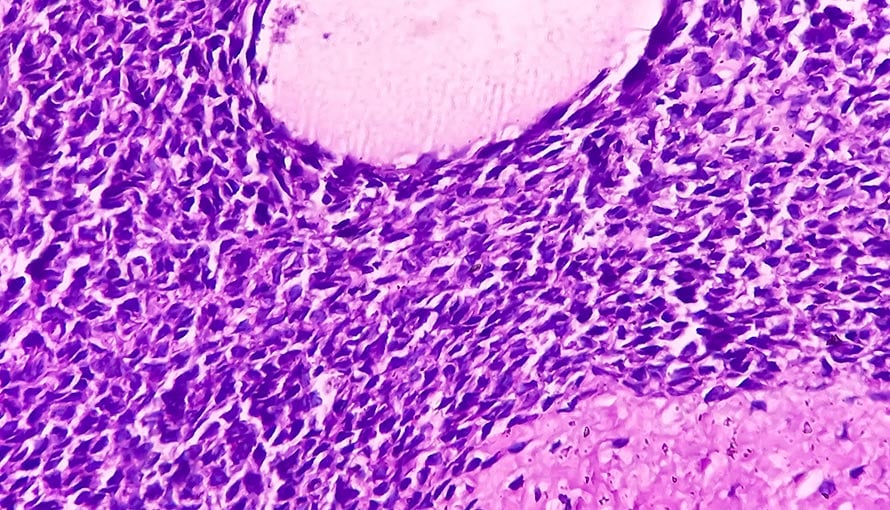FDA Approves New Gene Therapy for Synovial Sarcoma
Exciting news: Moffitt Cancer Center is proud to be the first authorized treatment center in the world for recently FDA-approved TCR therapy for the treatment of metastatic/unresectable synovial sarcoma.
In a groundbreaking development for patients facing synovial sarcoma, a rare soft tissue cancer, the FDA has approved a new gene therapy treatment. Synovial sarcoma, which typically affects the tissues around joints, is challenging to treat effectively due to tumor growth and progression. However, this new gene therapy promises to change the landscape of synovial sarcoma treatment by harnessing the body’s immune cells to target the cancer.
 Synovial Sarcoma Overview: Causes and Symptoms
Synovial Sarcoma Overview: Causes and Symptoms
Synovial sarcoma affects around 1,000 people in the U.S. each year, with most patients being male adults in their 30s or younger. The causes of this rare cancer that often surrounds the muscles and ligaments are unknown, but it can be linked to unusual chromosomal abnormalities that may contribute to its development. Other risk factors include being younger than 35, receiving previous radiation therapy for cancer, and frequent chemical exposure to arsenic, vinyl chloride, and thorium dioxide.
Synovial sarcoma symptoms form slowly, potentially going undetected for up to two years. When symptoms progress, they may show up as a painless lump in the affected area, sudden and sharp pains, or swelling. In rare cases, when a tumor forms around the chest, neck, or head, it can impact breathing and swallowing.
A synovial sarcoma tumor may spread from soft tissues around the knee, hip, ankle, or shoulder to other parts of the body, making early diagnosis and treatment critical for a better prognosis.
Current Synovial Sarcoma Standard of Care
The current standard of care for synovial sarcoma patients includes diagnostic testing such as X-rays, MRIs and CT scans, as well as genetic mutation testing or tumor biopsy. Following a diagnosis, recommended treatments may vary depending on the tumor stage and location as well as patient age and health.
Surgery is the primary form of treatment, but a patient’s care plan may also include radiation, chemotherapy, immunotherapy, anti-angiogenesis drugs to cut off the tumor’s blood supply, or targeted therapies.
Unfortunately, in metastatic cases where the cancer has spread, these therapies can fall short, underscoring the crucial need for expanded and more effective treatment options.

A New Breakthrough in Treatment
Earlier this month, the FDA announced accelerated approval for a revolutionary new gene therapy for metastatic synovial sarcoma. Tecelra (afamitresgene autoleucel) is officially the first engineered T-cell receptor (TCR) therapy approved for a solid tumor.
Tecelra genetically modifies a patient’s own T-cells to target the MAGE-A4 antigen, which is expressed in solid cancers, including synovial sarcoma. Administered in one infusion, Tecelra allows the immune system to recognize and destroy cancer cells more accurately as an alternative to the other cytotoxic systemic therapeutic options.
The clinical trial for Tecelra included 44 patients, with an overall response rate of 43.2% and a median duration of six months. Moffitt participated in these trials, and our involvement was led by Dr. Mihaela Druta, a medical oncologist specializing in this area and one of the study’s principal investigators.
Tecelra’s promising clinical outcomes represent a milestone in cell therapy development for solid tumors and offer renewed hope to patients with metastatic synovial sarcoma.
The Future of Sarcoma Cell Therapy Treatments
While treatment options for synovial sarcoma patients have historically been limited, this accelerated FDA approval offers earlier access to this new therapy. Now, patients who have received prior chemotherapy, are positive for specific HLA antigens, and whose tumor expressed the MAGE-A4 antigen have another treatment option available.
Already experienced in administering Tecelra throughout clinical trials, Moffitt Cancer Center is the first place in the world ready to deliver this therapy. As the number one cancer hospital in Florida, we’re pleased to offer the first new treatment option for patients with synovial sarcoma in over a decade.
While some cancer centers may be unfamiliar with such serious but rare diseases, Moffitt’s Sarcoma Program features a multispecialty team that routinely addresses complex and uncommon cancers like synovial sarcoma. Our expertise, personalized approach and commitment to finding new and effective treatment options ensure each patient can access the best care possible.
Patients don’t need a referral to come to Moffitt, but if you suspect your patient may have any form of sarcoma, we encourage you to refer them to Moffitt Cancer Center, the only NCI-Designated Comprehensive Cancer Center in Florida. Don’t hesitate to reach out.
If you would like to refer a patient to Moffitt's Sarcoma Oncology Program, complete our online form or contact a physician liaison for assistance. As part of our efforts to shorten referral times as much as possible, online referrals are typically responded to within 24 - 48 hours.
